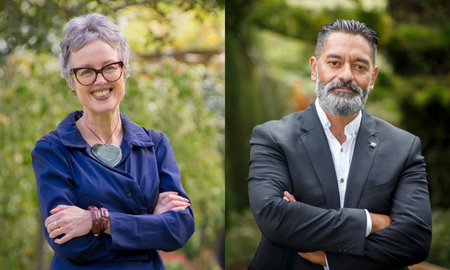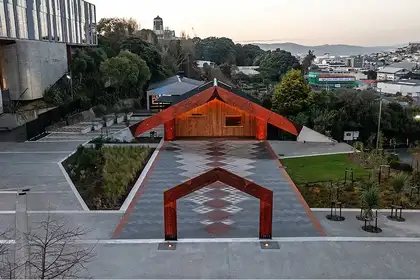
Te Rau Karamu Marae on the Pukeahu campus in Wellington.
Last month I wrote an opinion piece on why it was important for universities to retain a position of neutrality in regard to political matters. The case in point was why Te Kunenga ki Pūrehuroa Massey University is not making comment or adopting a specific position on the war in Gaza. I argued that this is entirely in keeping with the role of a university; it is not for the institution to make a political statement or adopt a partisan position, as its role is to facilitate a safe environment for staff and students to express their academic freedom. I stand by those comments.
However, this does beg (and has invited) some questions, particularly regarding Massey University’s strategic intent, which it has explicitly had since 2017, to place Te Tiriti o Waitangi at the heart of its teaching, research and operations, working towards becoming ‘Te Tiriti-led’. Isn’t the university’s Te Tiriti-led ambition at odds with adopting a stance of political neutrality? How can Massey uphold Te Tiriti o Waitangi, and yet not take sides in an issue where some argue there are parallel narratives of dispossession, invasion and subjugation of colonised peoples? My response is, no, there is no hypocrisy or contradiction in Massey’s continued stance of political neutrality and in what follows I want to explain why.
First, if the corporate entity known as ‘the university’ were to take an overt stand on any given political issue, it would immediately be at odds with the Education and Training Act 2020. The Act states, in so many words, that while staff and students may have views, the institution itself does not have the right to state an opinion. Rather, it is the role of the university to create the conditions where staff and students may exercise these rights. To paraphrase the oft-quoted 1967 Kalven Report, which, in general terms, set the basic foundation for discussions of academic freedom: ‘The instrument of dissent and criticism is the individual faculty member or the individual student. The university is the home and sponsor of critics; it is not itself the critic.’
Neutrality is one thing, so what about Massey’s strategic goals to be Te Tiriti-led? Massey’s position on upholding Te Tiriti o Waitangi is not a partisan political stance akin to taking sides in a war, declaring allegiance with one political party in an election campaign, or backing a particular candidate in the race for the White House (or 10 Downing Street); it is an institutional recognition of the founding constitutional document of Aotearoa New Zealand. Thanks to the efforts of numerous educators, it is now well known that Te Tiriti o Waitangi is not a political issue, but refers to an historical reality – a document signed between Māori and the British Crown in 1840. Massey’s commitments to honour Te Tiriti o Waitangi are not stated as political posturing; rather, Te Tiriti o Waitangi and its core principles are values that serve to guide the mission and purpose of the university, underpinning teaching, research and the core operations of the university in a way that is appropriate for our historical, geographical, and social context.
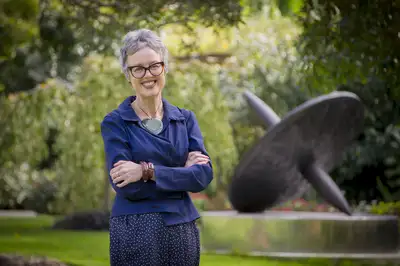
Professor Giselle Byrnes.
While universities, as autonomous and independent institutions, are at liberty to set their own strategic direction, and this usually reflects the core business of the university (excellence in teaching, research and engagement), the priorities of a university must also reflect and advance the wider values and vision of the communities in which that university is embedded. Massey’s publicly stated commitments to honour Te Tiriti fall into this latter category. In other words, Massey is reflecting and advancing the priorities and concerns of 21st century Aotearoa – it would simply not make sense for any university to be out of step with the communities it seeks to serve.
It might also be said that universities in Aotearoa New Zealand should adopt generic international principles – such as the ‘Princeton Principles’, developed in late 2023 by a group of scholars, some of whom are based at Princeton University. But these principles are problematic. They insist, for instance, that university governors, donors and alumni may step in and ‘intervene’ if there is risk that university administrators are limiting academic freedom in any way. This seems to run counter to the institutional and legislative autonomy of the public university as defined here in Aotearoa. Moreover, the ‘Princeton Principles’ emanate from a particular moral panic that I would argue is distinctive to the United States in this moment in history and it would be difficult to disentangle this document from that particular and specific context.
Finally, Massey has condemned violence and has stated that genocide is a crime that violates the fundamental principles of humanity and justice. The university has also issued statements saying it is saddened to see the violence and loss of human life in Gaza. In sum, while there are different views on how to interpret and give practical effect to Te Tiriti o Waitangi and its principles, Massey is not ‘taking sides’ in these debates; rather, it is recognising our nation’s founding document. Such a position cuts across partisan lines.
Professor Giselle Byrnes is Provost at Te Kunenga ki Pūrehuroa Massey University.
Related news
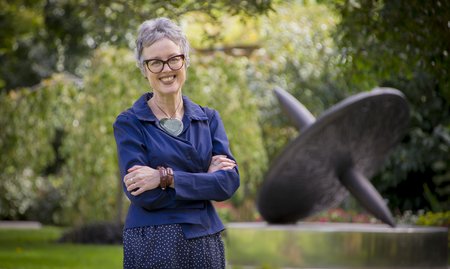
Opinion: Turning the tide for our Pacific learners
By Professor Giselle Byrnes and Professor Palatasa Havea MNZM.
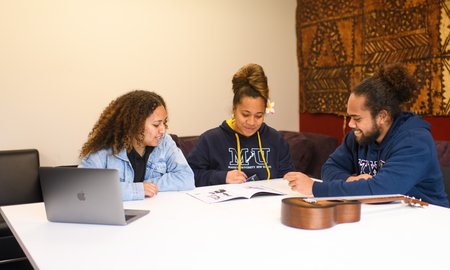
Opinion: Putting us on the right side of history
By Provost Professor Giselle Byrnes and Deputy Vice-Chancellor Māori Professor Meihana Durie.
